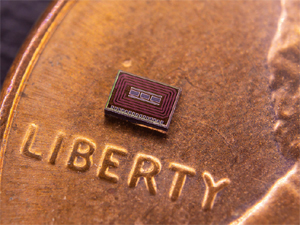



Date:12/04/18
 Scientists have come up with a novel tiny, ultra-low power chip that can be injected just under the surface of the skin to continuously monitor patients of substance abuse.
Scientists have come up with a novel tiny, ultra-low power chip that can be injected just under the surface of the skin to continuously monitor patients of substance abuse.
The chip can be powered wirelessly by a wearable device such as a smartwatch.
"A tiny injectable sensor -- that can be administered in a clinic without surgery -- could make it easier for patients to follow a prescribed course of monitoring for extended periods of time," said lead author Drew Hall, Professor at the University of California-San Diego.
The new bio-sensor chip measures roughly one cubic millimetre in size and can be injected under the skin in interstitial fluid -- the fluid that surrounds the body's cells.
It contains a sensor that is coated with alcohol oxidase, an enzyme that selectively interacts with alcohol to generate a byproduct that can be electrochemically detected.
The electrical signals are transmitted wirelessly to a nearby wearable device such as a smartwatch, which also wirelessly powers the chip.
Two additional sensors on the chip measure background signals and pH levels. These get cancelled out to make the alcohol reading more accurate.
The chip consumes as little power as possible -- 970 nanowatts total, which is roughly one million times less power than a smartphone consumes when making a phone call.
The current most commonly used device to estimate blood alcohol levels is the breathalyzer, a clunky device that requires patient initiation. They are also not that accurate.
"The ultimate goal of this work is to develop a routine, unobtrusive alcohol and drug monitoring device for patients in substance abuse treatment programs," Hall added.
"We don't want the chip to have a significant impact on the battery life of the wearable device. And since we're implanting this, we don't want a lot of heat being locally generated inside the body or a battery that is potentially toxic," Hall said.
The team presented the results at the 2018 IEEE Custom Integrated Circuits Conference (CICC) in San Diego.
This tiny injectable sensor may help curb alcohol abuse
 Scientists have come up with a novel tiny, ultra-low power chip that can be injected just under the surface of the skin to continuously monitor patients of substance abuse.
Scientists have come up with a novel tiny, ultra-low power chip that can be injected just under the surface of the skin to continuously monitor patients of substance abuse.The chip can be powered wirelessly by a wearable device such as a smartwatch.
"A tiny injectable sensor -- that can be administered in a clinic without surgery -- could make it easier for patients to follow a prescribed course of monitoring for extended periods of time," said lead author Drew Hall, Professor at the University of California-San Diego.
The new bio-sensor chip measures roughly one cubic millimetre in size and can be injected under the skin in interstitial fluid -- the fluid that surrounds the body's cells.
It contains a sensor that is coated with alcohol oxidase, an enzyme that selectively interacts with alcohol to generate a byproduct that can be electrochemically detected.
The electrical signals are transmitted wirelessly to a nearby wearable device such as a smartwatch, which also wirelessly powers the chip.
Two additional sensors on the chip measure background signals and pH levels. These get cancelled out to make the alcohol reading more accurate.
The chip consumes as little power as possible -- 970 nanowatts total, which is roughly one million times less power than a smartphone consumes when making a phone call.
The current most commonly used device to estimate blood alcohol levels is the breathalyzer, a clunky device that requires patient initiation. They are also not that accurate.
"The ultimate goal of this work is to develop a routine, unobtrusive alcohol and drug monitoring device for patients in substance abuse treatment programs," Hall added.
"We don't want the chip to have a significant impact on the battery life of the wearable device. And since we're implanting this, we don't want a lot of heat being locally generated inside the body or a battery that is potentially toxic," Hall said.
The team presented the results at the 2018 IEEE Custom Integrated Circuits Conference (CICC) in San Diego.
Views: 375
©ictnews.az. All rights reserved.Similar news
- Azerbaijani project to monitor disease via mobile phones
- Innovative educational system to be improved under presidential decree
- NTRC prolongs license of two TV and radio organizations for 6 years
- Azerbaijan establishes e-registry for medicines
- Azerbaijani museum introduces e-guide
- Nar Mobile opens “Nar Dunyasi” sales and service center in Siyazan city
- International conference on custom electronic services held in Baku
- OIC secretary general to attend COMSTECH meeting in Baku
- Azerbaijan develops earthquake warning system
- New law to regulate transition to digital broadcasting in Azerbaijan
- Azerbaijani State Social Protection Fund introduces electronic digital signature
- Intellectual traffic management system in Baku to be commissioned in December
- Tax Ministry of Azerbaijan started receiving video-addresses
- World Bank recommends Azerbaijan to speed up e-service introduction in real estate
- Azerbaijan to shift to electronic registration of real estate





















